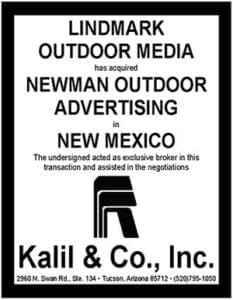 By Richard Rothfelder, billboard legal expert and Partner, Rothfelder Falick.
By Richard Rothfelder, billboard legal expert and Partner, Rothfelder Falick.
Lamar Outdoor Advertising v. Farmers Co-Op Oil Company of Sheridan, 215 P.3d 296 (Wyo. 2009).
Introduction
Lamar sued a landowner-seller and buyer to enforce a right of first refusal contained in Lamar’s billboard lease agreement. The parties entered into a settlement agreement that would allow the buyer to purchase the property and allow Lamar to relocate its billboard on the property. The enforceability of the settlement agreement was conditioned on the timing of the City of Sheridan’s consideration of and issuance of a variance to Lamar for the relocation of the sign on the property. After the City denied Lamar’s variance application, the buyer and seller moved to dismiss the litigation. The Court found that the settlement agreement was enforceable and therefore dismissed Lamar’s lawsuit with prejudice.
Summary
- Lamar operated a sign located on property in the City of Sheridan pursuant to a ground lease granting Lamar a right of first refusal. When the landowner attempted to sell the property to a third party, Lamar filed suit to enforce its right of first refusal.
- The parties entered into a settlement agreement during the litigation that would allow the third party to purchase the property if the City timely issued a variance to Lamar. The pertinent portion of the settlement agreement stated:
 The parties agree that the City of Sheridan shall have eight weeks from the date that the variance application contemplated in Paragraph 4 is submitted with all accompanying documentation required by the City of Sheridan. If the City of Sheridan denies the Variance application the agreements, obligations, releases and all other commitments contained in this agreement are null and void. If the City of Sheridan approves the application or fails to act on the application within the eight week period provided for herein the parties will be bound to the agreement contained herein. If the City of Sheridan fails to act upon the application because of any action or inaction by Lamar the parties will be nonetheless bound by the terms of this agreement to the extent permitted by law.
The parties agree that the City of Sheridan shall have eight weeks from the date that the variance application contemplated in Paragraph 4 is submitted with all accompanying documentation required by the City of Sheridan. If the City of Sheridan denies the Variance application the agreements, obligations, releases and all other commitments contained in this agreement are null and void. If the City of Sheridan approves the application or fails to act on the application within the eight week period provided for herein the parties will be bound to the agreement contained herein. If the City of Sheridan fails to act upon the application because of any action or inaction by Lamar the parties will be nonetheless bound by the terms of this agreement to the extent permitted by law.
- Lamar submitted its variance application on August 2, 2006. The passage of eight weeks would therefore fall on September 28, 2006. However, after submitting the variance application, Lamar realized that it failed to adhere to a local posting requirement for variance applications. Therefore, on September 27, 2006, Lamar’s agent submitted an Affidavit of Posting of Public Notice to the City.
- On October 12, 2006, the City denied Lamar’s variance application. The buyer and seller later moved to dismiss the litigation and enforce the settlement agreement.
- The buyer and seller’s argument was simple – Lamar submitted its variance application on August 2, the City did not act on the application within the eight weeks following August 2, and therefore the agreement was binding and enforceable.
- Lamar countered by arguing that the submission of its affidavit on September 27 was the date from which the eight week clock should run since the affidavit represented “accompanying documentation.” Because the City denied the variance request on October 12 (well within eight weeks of the affidavit), Lamar argued that the settlement agreement was rendered null and void.
- The Court’s upholding of the settlement agreement and ruling in favor of the buyer and seller hinged on the adequacy of Lamar’s affidavit.
- The Court found that the affidavit submitted to the City fell short of the statutory requirements for affidavits contained in the Wyoming Rules of Civil Procedure. The Rules require that affidavits (1) be made on personal knowledge; (2) set forth facts which are admissible in evidence; (3) demonstrate the affiant’s competency to testify on the subject matter of the affidavit; and (4) have attached to it the papers and documents to which it refers.
- The Court found that the affidavit did not meet the “personal knowledge” because the only explanation given for the basis of Lamar’s agent’s personal knowledge was that he “is familiar with the matters set forth herein, and they are true to the best of his knowledge, information and belief.”
- Additionally, the affidavit did not attach the variance application, letter of notification to neighboring property owners, or evidence of meetings with City officials referenced in the affidavit.
- Because Lamar’s affidavit was procedurally deficient, it could not provide the evidentiary support necessary to defeat the buyer and seller’s motion to dismiss
Takeaways
Exercise caution when entering into any agreement amending the terms of an otherwise enforceable lease. Lease agreements often contain valuable, irreplaceable rights, so be wary of taking any action to alter a valuable and enforceable agreement. Additionally, always be aware of all local and procedural requirements for submission of variance or permit applications. Be cognizant of applicable deadlines, as well as the likely turn around and processing times for applications, as these can have a serious impact on appellate remedies down the road. Finally, avoid conditioning agreements on the actions of third parties, permitting authorities, or persons that are unpredictable or uncontrollable.
[wpforms id=”9787″]

















